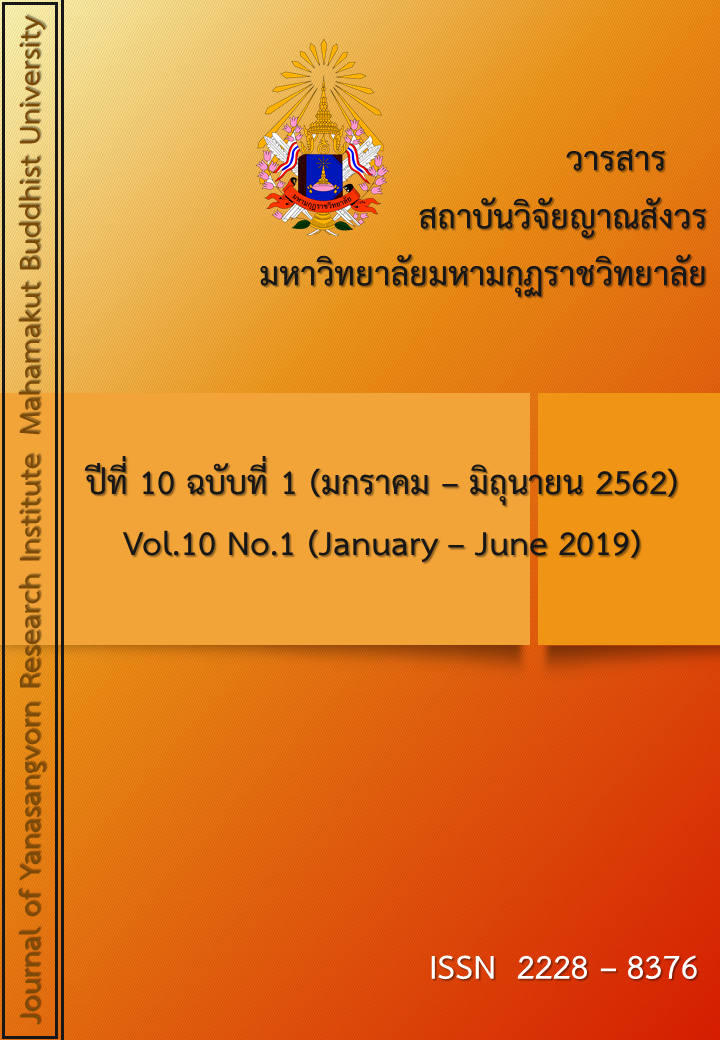THE ROLE OF MONK TEACHERS THE DHAMMA IN SCHOOLS TO MODIFY SEXUAL RISK BEHAVIORS OF ADOLESCENTS TO PREVENT UNWANTED PREGNANCY
Main Article Content
Abstract
The objectives of this research article were as follows: 1) to study the role of monk teachers the dhamma in schools to modify sexual risk behaviors of adolescents to prevent unwanted pregnancy, 2) to find correlation between the role of monk teachers the dhamma in schools and the modify sexual risk behaviors, and 3) to study other suggestions of the role of monk teachers the dhamma in schools. Research was mixed methods both quantitative and qualitative. The sample group was the 211 people in 11 provinces who were monk teachers the dhamma in schools under the responsibility of Mahamakut Buddhist University, Sirindhornvidyalaya Campus, including in-depth interviews with key informants 11 people. The tools were questionnaires and structured in-depth interviews. The statistics used were frequency, percentage, mean, standard deviation, t-test, F test, and correlation coefficient. Qualitative analysis uses content analysis. The results of research were found that 1) the role of monk teachers the dhamma in schools to modify sexual risk behaviors of adolescents to prevent unwanted pregnancy had on a moderate level in 4 aspects. The knowledge had on a high level. Training, Support of creative activities and the coordination with relevant agencies had on a moderate level. 2) The results of hypothesis testing were found that correlation between the role of monk teachers the dhamma in schools and the modify sexual risk behaviors of adolescents were found that had correlate with the statistical significance at .01.. And 3) the monk teachers the dhamma in schools provided the following important suggestions: The Home, Temple and Schools should cooperate in educating teenagers about sexual risk behavior Behave according to tradition, culture and good society And instill in the youth awareness of continuous good deeds.
Article Details
References
กิจเมธี ติกฺขวีโร, พระครูปลัด (เพื่อนฝูง). (2555). “การศึกษาบทบาทของพระสงฆ์ในการปรับเปลี่ยนพฤติกรรมของเยาวชนในเขตตำบลดอนมูล อำเภอสูงเม่น จังหวัดแพร่”. วิทยานิพนธ์พุทธศาสตรมหาบัณฑิต (พระพุทธศาสนา). บัณฑิตวิทยาลัย : มหาวิทยาลัยมหาจุฬาลงกรณราชวิทยาลัย.
จักนรินทร์ เหลืองอ่อน. “บทบาทพระสอนศีลธรรมในโรงเรียนกับการมีส่วนร่วมในการส่งเสริมจริยธรรมแก่นักเรียนในโรงเรียน : ศึกษาเฉพาะพระสอนศีลธรรมในโรงเรียนพื้นที่อำเภอเมือง จังหวัดพิษณุโลก”. วิทยานิพนธ์รัฐประศาสนศาสตรมหาบัณฑิต (นโยบาย สาธารณะ). บัณฑิตวิทยาลัย : มหาวิทยาลัยนเรศวร.
ชูศรี วงศ์รัตนะ. (2541). เทคนิคการใช้สถิติเพื่อการวิจัย. พิมพ์ครั้งที่ 7. กรุงเทพมหานคร : เทพเนรมิต.
ถวิล ธาราโภชน์ และศรันย์ ดำริสุข. (2543). พฤติกรรมมนุษย์กับการพัฒนาตน. กรุงเทพมหานคร : ทิพยวิสุทธิ์.
ธีระศักดิ์ อุ่นอารมณ์เลิศ. (2549). เครื่องมือวิจัยทางการศึกษา : การสร้างและการพัฒนา. นครปฐม: ภาควิชาพื้นฐานทางการศึกษา คณะศึกษาศาสตร์ มหาวิทยาลัยศิลปากร.
ประสิทธิวรการ, พระครู (ณรงค์ ธมฺมสุนฺทโร). (2555). “การศึกษาความคาดหวังต่อบทบาทของพระสงฆ์ในการป้องกันและแก้ไขปัญหาพฤติกรรมที่ไม่พึงประสงค์ของเยาวชนกรณีศึกษา อำเภอลอง จังหวัดแพร่”. วิทยานิพนธ์พุทธศาสตรมหาบัณฑิต (พระพุทธศาสนา). บัณฑิตวิทยาลัย: มหาวิทยาลัยมหาจุฬาลงกรณราชวิทยาลัย.
สมศรี บุญทัน, พระมหา. (2554). “บทบาทของพระสงฆ์ต่อการเป็นครูสอนวิชาพระพุทธศาสนาในโรงเรียนนางรอง อำเภอนางรอง จังหวัดบุรีรัมย์”. วิทยานิพนธ์รัฐประศาสนศาสตรมหาบัณฑิต. บัณฑิตวิทยาลัย : มหาวิทยาลัยราชภัฏบุรีรัมย์.


